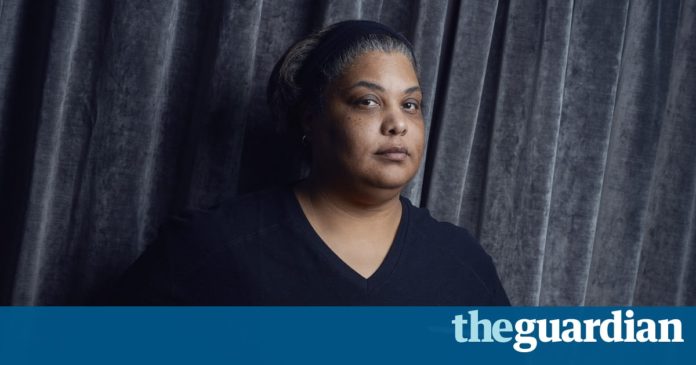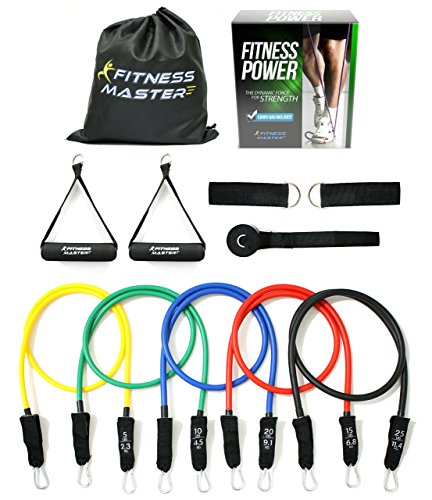The publication of her memoir Hunger has sparked furious debate on fat activism. The author, professor and bad feminist talks to Lindy West about race, weight and why she objects to being called a diarist
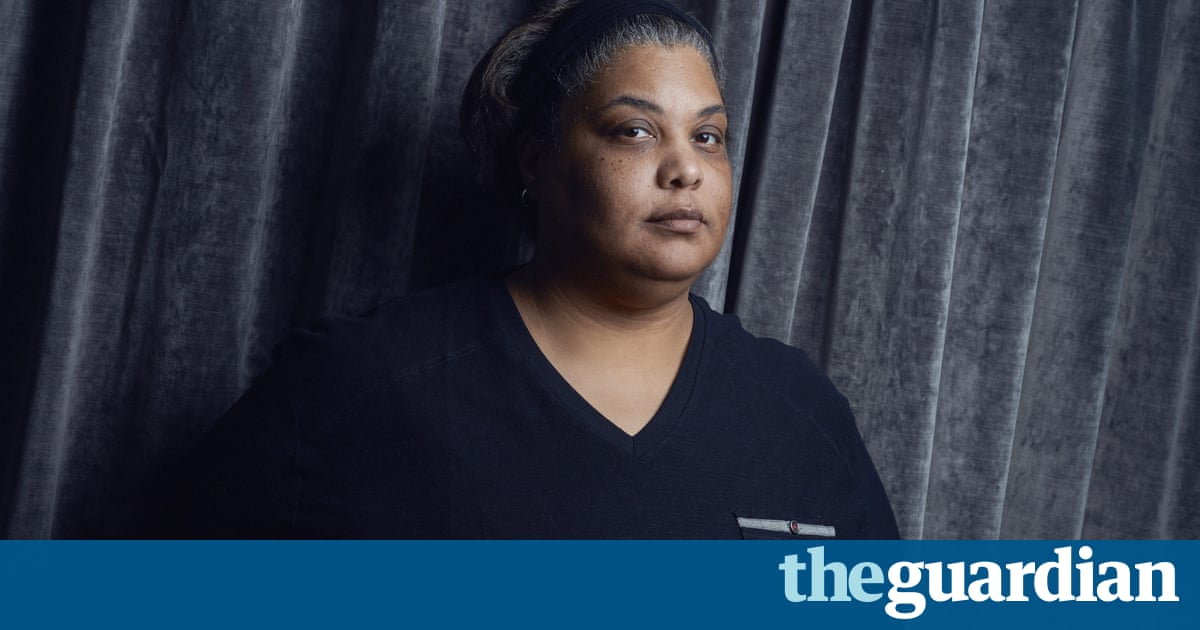
Roxane Gays Hunger: A Memoir of (My) Body was described to me by multiple people as an almost unbearably brutal book, and it is. You yearn for Gay to be a little kinder to herself as she glides through her past, reckoning with all the things she did with her body and, more significantly, the things that were done to it. But, you realise, anything less would be dishonest. We dont hold back when we talk to ourselves about ourselves, and thats what Gay has given us here: elegantly rendered essays with the intimacy of an inner monologue. Theres something about honesty this bare you cannot argue with it. Lines such as, I am always uncomfortable or in pain, leave you no wiggle room to turn away from empathy. Gay may not want to be a spokesperson for all fat people Hunger is adamantly her story, not a universal story but the fact is that thin people will read this book and be changed. I sat down with her at home in Los Angeles.
LW: Im resentful of the way that fat people and also, especially, rape victims are expected to just flay themselves and let any old person dig around inside them to earn their humanity. But I guess, on the other hand, telling these stories is cathartic. And hearing the stories of fat women helped me, it made my life better, and I think it does make a difference in terms of the general perception of us. So, how do you walk that line between maintaining your dignity and not just letting people eat you alive?
RG: I just have firm boundaries and I stick to them. A lot of times in interviews people just want me to repeat everything I wrote in the book.
So, you were raped? Yeah. And then they want details, and Im just like: Well, read the book, because I dont need to recite it over and over again in order for it to be relevant or real. Its very weird, and I suppose thats the price you pay when you write personally as a woman. But, whats interesting to me is that people focus on the personal, and they completely ignore the professional. Like … that its a book. That you used craft to write the book, that its not a therapy session, or a diary entry.
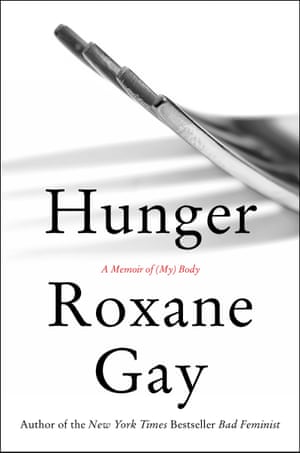
There is this idea that its easy.
Yeah, like: Oh yeah, I just sort of jotted down a few memories, but no, thats not true. You have to organise things, and you have to make decisions, and you have to think about voice and style and its a lot of work.
And there are layers of people not taking you seriously. People already dont take you seriously as a woman, people dont take you seriously as a fat person, people dont take you seriously as a black woman. It is a lot to get past.
It is a lot to get past, and whats interesting is that even other writers who know better will dismiss the work that youre doing. The two negative reviews that Ive gotten have called me a populist, and
As a pejorative?
Well, I dont think its a compliment. Donald Trump is considered a populist. Today, the New Yorker called me a diarist.
The opening lines were that I came to fame as a diarist, which is just not true. I have a whole body of work. But even if it were true, theres this smug sense that its just: Oh, Im sitting in my bed and I opened up my heart-locket diary and Im just jotting down some thoughts! and its just all emotion and that none of it is intellectual.
And that womens lives are not serious.
Correct, because no ones calling … whats his name [Karl Ove] Knausgaard. No ones calling him a diarist. And he is a diarist. Its odd.
Do you like writing non-fiction?
It depends on the kind of non-fiction that Im writing. I do enjoy writing essays. The reality is that a lot of the non-fiction that I write is on difficult stuff, so it can be challenging.
I never wanted to write about my body, and I didnt want to write about being harassed on the internet. I was just talking to Ijeoma Oluo, my sister-in-law, and its not like Ijeomas favourite thing is racism and its the only thing she wants to talk about. But were cornered. Were forced into these niches in a way that white men never are. And it seems like a through-line, even in Bad Feminist, that you never asked to be an activist or a representative.
No, I did not. I dont shun it. But the cultural imagination is very limited, and when you talk about one issue, people think that youre the spokesperson for that issue and that you dont have the range, that thats all youre capable of doing, whether its racism or fatness or trolling on the internet. And its so unfair and its so limiting, and it shows that marginalised people arent allowed to be artists. They arent allowed to be intellectuals. Were expected to only be activists or people who are singular and can only write about the self.
So, what are you passionate about? What are your favourite things to write about?
My favourite things to write about are pop culture I love writing about pop culture. I love writing fiction. I love writing about gender-related issues. Im really interested in writing about reproductive freedom. That is something I do enjoy writing about, as much as one can enjoy it, because it just boggles the mind that were still having these conversations about equitable access to womens healthcare.
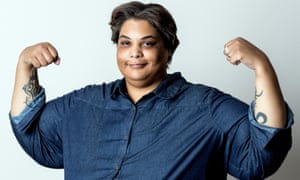
It seems as if the next frontier in fat activism is figuring out how to let people actually have the feelings that they have about their bodies without validating our cultures hierarchy of bodies. I think about the negative responses within the fat community to Gabourey Sidibe and Ashley Nell Tiptons weight-loss surgery, and, a movement so dominated by white women telling women of colour who are trying to live in showbusiness and fashion that they have to just swallow it every day
For the greater good. And then for whose greater good? I didnt realise Gabourey had had the surgery until I read her memoir. And then I thought, of course. I knew it was going to happen eventually, and I understood. Because to be that visible in popular culture, now the more weight she loses, as heartbreaking as it is, the more roles shes going to get, and the more of a career shes going to have, and people always want someone to take it for the team to their own detriment. But its such a personal choice like, let her live. Only she lives in her body and only I live in my body and only you live in your body.
It is important to talk about the fact that weight-loss surgery is dangerous, that people die. Its barbaric that so many people feel pressured to have this surgery that can kill them. But also, so much of what the fat acceptance movement does is catalogue all the ways that this system is unbearable to live inside of. And then to tell people that they failed by caving in any variety of ways to this system that we know, better than anyone, is unbearable? It doesnt make any sense. And I just have no interest, as a feminist, in adding things to the list of impossible standards.
I agree. I think we can have critical conversations, as challenging as it is to hear yourself being criticised, but when you condemn the choices of other women and I dont believe in choice feminism but when you condemn rational choices like, can you imagine how staggering fatphobia is that someone says, Yeah, Im going to have surgery to completely rearrange my body for the rest of my life, and Im going to be nutrient-deprived for the rest of my life, and I might die doing this, but thats better than spending another day in this body in this world. I have nothing but empathy for anyone who gets the surgery.
I have a great following and I love that, but that doesnt protect me from the asshole at the table next to me in a restaurant, or the guy shouting at me from his car when Im walking down the street, or the kid on the aeroplane two days ago that stood on his seat and looked back at me and said, Youre a big guy, over and over again. These are not things that success can shield you from.
And to have to convince people that thats real, on top of dealing with it, is so exhausting.
It is exhausting, because often I think: Oh, its not that bad, or Its in your head, but no, it is that bad. And actually, its much worse and Im being circumspect because I have to be able to hold on to a shred of dignity to get through the rest of this day.
Whats the weirdest diet advice youve ever received?
Oh, its all weird, and its all terrible. You know, fat people know more about nutrition and exercise than pretty much anyone else. The other day a man wrote to me and he said something to the effect of, I dont know if you know this, but exercise is required to lose weight. So maybe you should walk three times a week. And I was like: Huh! Maybe youre on to something! People assume that we dont work out. I have a trainer. I know what exercise is. Ive taken nutrition classes. Ive had nutritionists. Ive had therapists. I have spent so much money on weight loss over the past 30 years.
The fat tax.
Seriously. Ive spent at least $150,000 on weight loss. At this point the surgery would be the cheapest thing I do.
Do you still consider surgery?
Ive thought about it. Im always thinking about it. Im really scared of it. But I support people who want to do it I get reaching the breaking point.
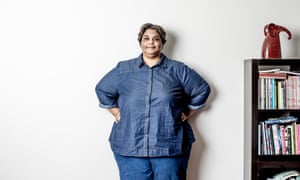
What I would love is if people, especially really young women, had doctors who took them seriously, and didnt just tell them, Oh, you have to get this surgery or youre going to die. What people need is real information.
And real healthcare! Half the issues that fat people face happen because of accumulation of lack of healthcare. Its not that you just are fat and all of a sudden you have diabetes or high blood pressure, its that you go to the doctor for a physical or strep throat or heart palpitations and they just say, Youre fat, lose weight, and they dont treat you, and then you stop going to the doctor. And then 10 years later, of course youre an explosion of medical issues. Because youre a human body and you havent seen competent medical professionals. Its a disgrace.
Youre accomplished and successful and revered do you ever think: Man, where would I be if I was conventionally hot?
One of the things I joke about with my mom all the time is that if I was conventionally hot and I had a slammin body, I would be president. Absolutely. Because when I think about how hard Ive had to work to get to where I am one of the things that gets under my skin is that Im always referred to as prolific. And thats fine. I am prolific. But people dont understand where that comes from. Do you see how much I had to write to get you to even notice me? And thats because Im fat. I know that. Thats how much work Ive had to put in to get a fraction of the attention that a conventionally attractive thin person is going to get. And to just be dismissed Im not going to let it go as a populist and a diarist? Its Dr Diarist to you.
Hunger: A Memoir Of (My) Body is published on 6 July by Corsair
Read more here: http://www.theguardian.com/us
